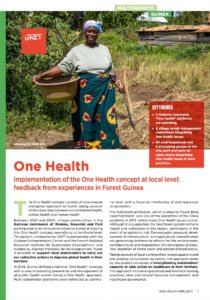The One Health concept promotes a unified, integrated, systemic approach to public, animal and environmental health, notably in light of the development of potentially epidemic zoonotic diseases. Zoonoses are diseases and infections that are naturally transmissible from animals to humans.
With the One Health project, GRET and the Guinean entrepreneurs’ centre (MGE) are supporting households, villages and three municipal platforms in three rural communes with a population of 42,500 people in the prefecture of Nzérékoré, in Forest Guinea. The objective of the project is to take greater account of overall health issues in agricultural, food and natural resource management practices, in mechanisms for local governance and within spaces for multi-stakeholder dialogue.
The One Health project will be conducted over a period of three years. It is aligned with the “One health” National strategic plan (2019-2023), drawn up by the Guinean government following the 2015 Ebola epidemic, which was mainly concentrated in the area where the project is taking place.
 To read
To read«Implementation of the One Health concept at local level:feedback from experiences in Forest Guinea» (May 2025)
The brochure presents the objectives, actions, and results of the “One Health” project carried out in Forest Guinea from 2021 to 2024. It highlights the challenges of implementing the One Health concept locally, as well as solutions such as agroecology and community-based natural resource management. It includes testimonials, key figures, and recommendations for an integrated health approach. Finally, it emphasizes lessons learned and key levers for scaling up.
Together with the stakeholders concerned, GRET and MGE are using their knowledge of value chains that are prevalent in the project zone (rice, palm oil, pork) to explore related overall health issues.
Based on a multi-sectoral participative diagnosis in the three target municipalities and the value chains concerned, the project intends to build shared knowledge on the concrete links between public, animal and environmental health.
Subsequently, it will support stakeholders to collectively implement actions contributing to the improvement of overall health in the territory, and of their overall health resilience, while examining the appropriate level of decision-making. The gender dimension is included in the project.
This innovative project also features a capitalisation process. The latter will document the choices made throughout the project. It will support reflections on the innovations contributed and on the conditions necessary for the implementation of the One Health approach at territorial level.